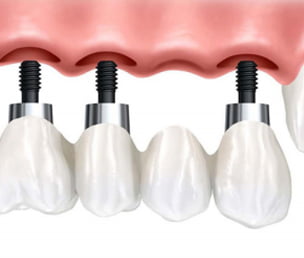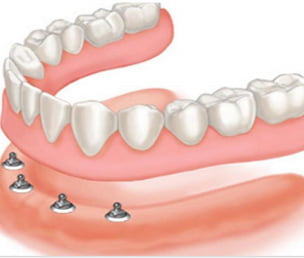 About dental implants
About dental implants
A dental implant is an artificial tooth root made of titanium. It is gently embedded in the jawbone and serves as a foundation for your new tooth. The replacement tooth, called a crown, is affixed to the implant, effectively replicating the anatomy of a natural tooth.
Many people have asked us for guidance in choosing a qualified dentist to place dental implants. We compiled this guide to serve as a reference, helping you evaluate the skills and knowledge of your dentist before embarking upon treatment.
Always ask these twelve questions.
You want to find out how many years your dentist has been performing this procedure, and how many implants are placed annually. A dental implant surgeon is likely to place more than 50 implants monthly.
Highly experienced implant surgeons are better able to prevent and cope with complications. The dentist’s skill is the single most important factor in the outcome of implant treatment.
CT (computed tomography) scanning provides a more accurate view of the bone and oral structure. This improves safety, because the implantologist can plan surgical placement with precision.
Most likely, CT scanning will eventually become a requirement for implant treatment. At this time, it is the best practice, but some dentists still do not use it.
Ideally, the dental lab and the dentist are in the same location. This is beneficial for several reasons. It facilitates fast and accurate communication between the implantologist and technician. It also improves the quality of restorations, because impressions can be delivered to the lab immediately after being removed from the patient’s mouth. This is important, because dental impressions begin degrading quickly.
It can be very difficult to predict the result, because the quality of work can vary greatly. If you are considering this option, find out if your dentist’s system is compatible with those used here in the UK, which is imperative for future treatment. Does their system have twenty years of clinical research showing effectiveness? Also find out how long the implants are guaranteed for, and if the clinic will pay travel costs should you have issues.
It is always best for the patients and dental technician to meet in person. This allows the patient to give feedback on the colour and appearance of restorations as they are designed. The technician can make adjustments on the spot, refining the design until the patient is happy. In addition to improved results, this helps avoid miscommunications and delays.
Implants are long-lasting and durable, so a skilled implantologist is typically able to offer a guarantee. This is usually good for at least three years, with the provision that the patient attends regular hygiene appointments. In certain situations, pre-existing medical conditions may increase the likelihood of implant failure, therefore reducing the duration of the guarantee. Be sure to discuss this with your dentist.
Difficult cases may call for advanced procedures such as ramus blade implants block bone grafts, sinus lifts, or the ridge split technique. Even if your case is simple, asking this question will help you judge the skill and competency of your dentist. An implantologist who is willing to take on these difficult cases is likely to be quite competent in routine implant placement.
Everyone wants the greatest value when making an investment such as dental implants. Generally, the cheapest price available is the result of compromised quality, while the most expensive option may be overpriced. In dental implants, providers who perform a large number of cases every month are generally able to offer a lower price on high-quality treatment, because they have the advantage of purchasing supplies in volume.
Proper cleaning and oral hygiene are critical to the longevity of dental implants. This point will be emphasized by dentists who take pride in the quality of their work, and who want to see your implants last for life. Your dentist is likely to recommend a follow-up appointment with a dental nurse or hygienist to discuss cleaning of implants. At The Denture and Implant Clinic, a hygiene appointment is offered to every implant patient, at no extra charge.
The discovery of PRGF was a breakthrough in the medical field, providing a safe and natural way to enhance healing. It is used in dentistry to improve patient comfort and improve the success of oral surgeries, including implant placement.
Without assistance, the bone is slow to heal and grow around an implant. Many people hesitate to replace missing teeth due to concern about their appearance and ability to eat during an extended recovery period. PRGF facilitates fast, complication-free healing, so that implant placement causes minimal discomfort or disruption to patients’ daily lives.
The simple procedure begins with a small amount of the patient’s own blood, which is processed in a centrifuge spinner. It isolates specific proteins, which are critical to healing. The proteins are applied to the surgical site, amplifying the natural healing process.
PRGF is a non-invasive, chemical-free, and safe way to improve tissue regeneration. It has been used across Europe, with excellent results.
Your comfort during the implant procedure is critical. Many people feel nervous when having oral surgery, and it is important for the dentist to understand this. We take steps to provide painless, gentle treatment for every patient. Local anaesthetic can numb the surgical site, but we recognize that phobic patients may need additional help relaxing. Therefore, we have an anaesthesiologist on-site, who can provide sedation when needed.
Some dentists will place implants for their own patients, but they are not known as experts in the field. Those who accept referrals are highly skilled, and typically perform a significant number of implant surgeries. If your dentist accepts referrals, you can take this as a sign of experience, and likely quality work.
Take the first step
Are you considering dental implant treatment? If so, visit The Denture and Implant Clinic in Surrey for a no-obligation consultation. Just call us at to schedule.
About this guide
The questions listed above are designed to facilitate a discussion, and help you evaluate the skill level of your implantologist. If you have any concerns about the treatment recommendation you have been given, we invite you to visit The Denture and Implant Clinic for a second opinion.
Understand your implant options

Replacing a single tooth
A cosmetic crown supported by one implant is the ideal alternative to conventional solutions. The procedure is straightforward and simple when performed by a qualified implantologist. The implant can be placed and restored at the time of extraction, for one-day tooth replacement.

Replacing multiple teeth
At least two dental implants are needed to support a fixed bridge. The implants create a stable foundation for your new teeth, and the help prevent bone loss by stimulating tissue. This is a very long-lasting and functional solution for several missing teeth.

Replacing all of your teeth
A full denture plate can be supported with four to six implants. They stabilize the denture, allowing you to eat, speak, and smile in comfort. Additionally, implants serve the same function as tooth roots, stimulating the jawbone and keeping it healthy.

Implant retained full dentures
This is a simple and economical option, involving attachments embedded in the dentures. These snap onto the implants, keeping dentures comfortable and stable, yet they are still removable.
Do I have enough bone for implants?
Many people experience bone loss in the jaw, especially those who lost their teeth to gum disease. Often, these people worry that they are not candidates for dental implants. However, there are several safe and reliable methods of increasing bone volume. These include:
Option 1
For smaller areas, granular bone is added around the implant site. It creates a structure for bone growth. Over time, it will be replaced by your own bone. The product may made from artificial bone, bovine bone, or human donor bone. Your implantologist will discuss the best type for your situation. We will avoid certain types of bone at your request.
The process is completed in four simple steps:

The area is numbed with local anaesthetic

Bone is placed at the grafting site

The graft is sealed

The gum tissue is closed with sutures
Option 2



Why choose The Denture and Implant Clinic?
About the dental implant procedure

Step 01
We begin with a detailed, three-dimensional CT scan of the jawbone. It is used by the implantologist to plan your treatment. Dental implants are then placed at precise locations, and the tissue is closed. We provide temporary restorations to fill the gap in your smile during healing.

Step 02
When the implant site is healed, the gum tissue is re-opened, and an impression is taken. Our master laboratory technician will use this impression to create your new tooth or teeth. Next, your beautiful new restoration is placed.

Step 03
The final step is healing of the jawbone. For the upper jaw, this typically takes three to six months. During this time, the bone fuses to the dental implant.
Same day implants
For patients with adequate bone volume, the implant and new tooth can usually be placed in the same appointment. That means you will walk out of our office with a brand-new smile in just one day.
The replacement teeth (crowns) are long-term temporaries. They will be replaced by your permanent crowns in approximately three to six months, after healing is complete. However, there is no need to worry about the appearance of your smile. The temporary crowns are just as beautiful as the permanent ones are.
This procedure may be used for replacing one or several teeth, or even an entire arch.
Aftercare
What to do after receiving dental implants

Food
We recommend a soft diet with foods such as rice, pasta, and fish.

Pain Management
We will write a prescription for medication that helps control pain and inflammation. The use of PRGF significantly reduces post-operative discomfort, and you may not feel the need to take painkillers. However, we advise you to take them anyway, for inflammation control.

Antibiotics
We will also provide a prescription for antibiotics. We strongly advise you take the full course as a preventive measure.

Smoking
We advise against any nicotine use after implant treatment, particularly in the first few days.
Are you ready to enjoy a beautiful, confident smile and better quality of life? Call The Denture and Implant Clinic to arrange a consultation.
Call Now 020 8629 1226








